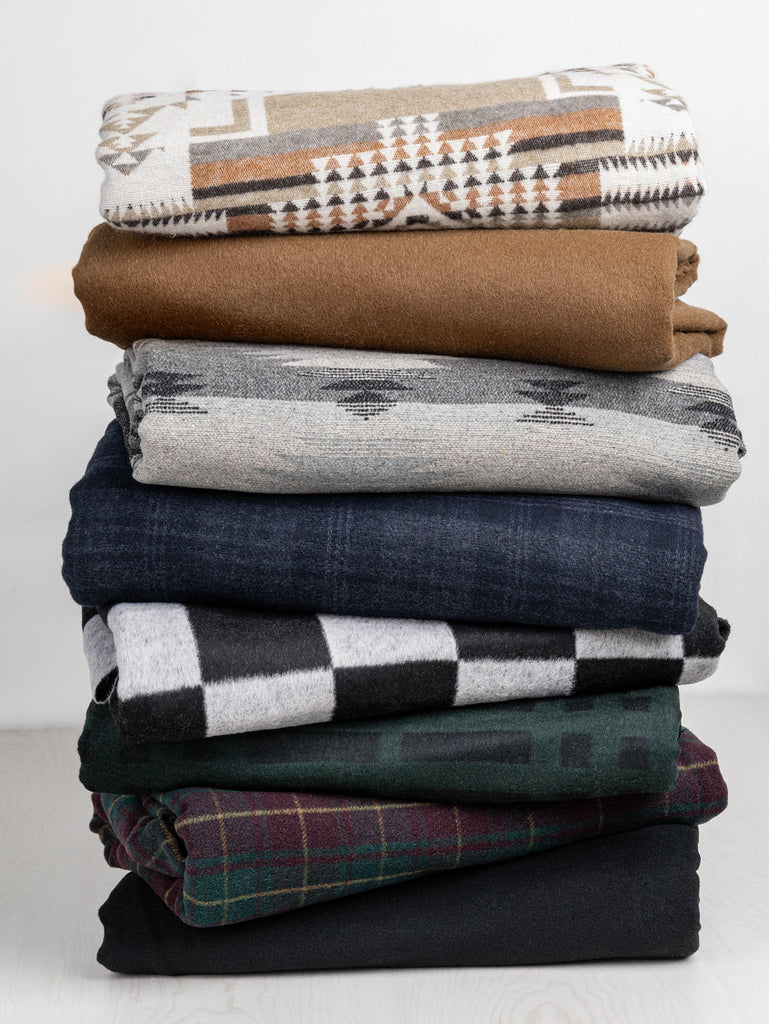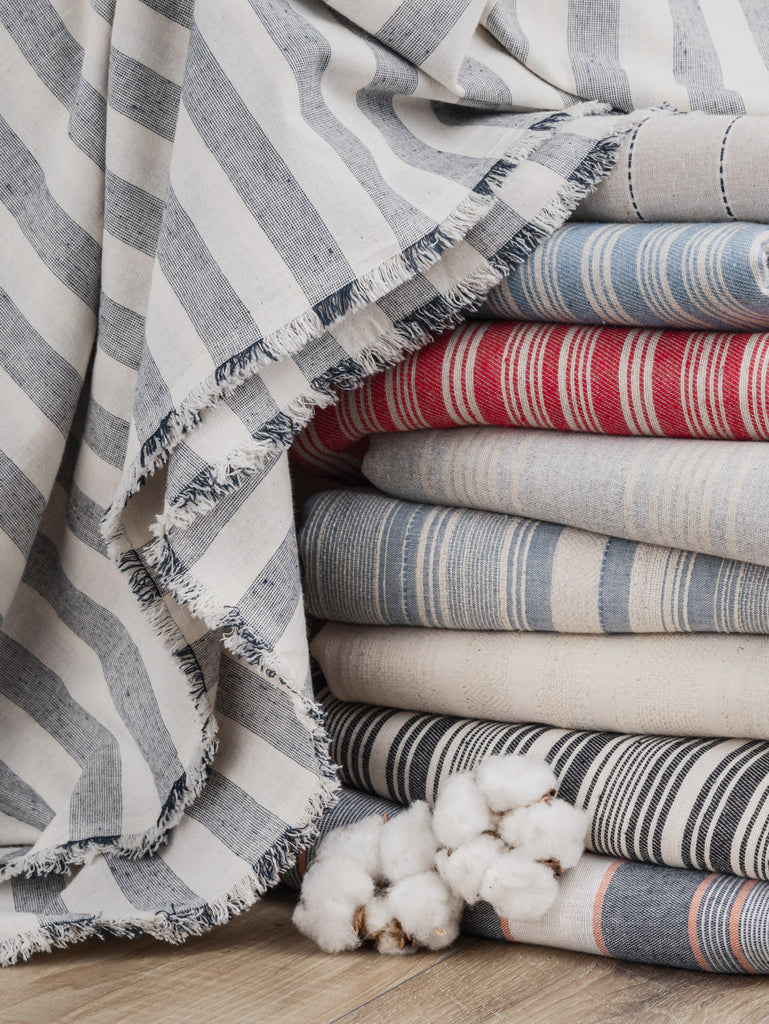Understanding Textile Certifications & Terminology When Buying Sustainable Fabric

Organic? Fair trade? Ethically sourced? Our buying power as consumers and our desire to be more ethical in our purchases has shifted the way things are done in almost every industry, from food to hand soap. Whether you're concerned about humans rights abuses or chemicals on your body and in your home, everyone seems to be aware that a lot of the ways we manufacture, source, and deliver products requires a radical rethink.
Most of us are here because we are fed up with the fast fashion industry. We realize sewing our clothes produces a better-finished result and less waste, not to mention the chain reaction of consequences that comes from buying ready to wear. It always makes me think of this scene from the Good Place... even when we think we're making good choices, we can't know what happened at every stage of that garment's journey.
While we may be sewing for all the right reasons, where is the fabric coming from that we’re using to sew our clothes? And who is affected in the production of these textiles? Part of the reason we started Core Fabrics was to make it easier to understand how the fabric we’re using is being produced since the industry can be very opaque.
With that in mind, we thought we’d explain the terms and certifications you might encounter when shopping for sustainable textiles (or “Feel Good Factors”, as we refer to them internally), whether that’s at Core Fabrics or elsewhere. Hopefully, this demystifies confusing jargon and makes it easier for you to make informed decisions as a sewing consumer.
Deadstock Fabric

Deadstock fabric refers to surplus materials from textile mill and garment production. It may be “extra” for various reasons; maybe they ordered too much, it was dyed the wrong colour, or some other production hiccup occurred. Either way, it’s now leftover fabric without any plans for present or future use. Not only does this make it inherently one-of-a-kind, but it also means that it needs a new home.
Buying deadstock ensures it doesn’t end up in a landfill – a nice bonus is you end up with high quality, oftentimes designer fabric, at a fraction of the price it would cost otherwise. While some debate the true sustainability of deadstock, we consider it a good option for a few reasons. One: we didn't need to place an order for this fabric, so no "new" resources were used to produce it. Second: if there is no market for deadstock, it gets thrown away. Here in Montreal, fashion capital of Canada, we've encountered many businesses who dispose of rolls of fabric rather than find them a new home. But there are also lots of "jobbers" who source all these roll ends and leftovers and make sure they have a second life.
You can shop all our deadstock fabrics here.
Recycled Textiles

While it may seem obvious, recycled fabrics are made from recycled fibres. This is becoming more and more common as we start to address the realities of unsustainable fabric production, particularly when it comes to petrochemical-based fibres like nylon and polyester that may have important technological benefits (durability, water resistance etc) but are created from non-renewable resources.
It’s exciting to see new textiles created from ocean plastic, or recycled from existing textiles, and we’re only at the beginning of these tech breakthroughs. At Core Fabrics we’re currently carrying a line of recycled cotton like this one that is spun and woven using no added dyes and minimal water. We’re also carrying a line of cupro that is made from a base fiber of recycled cotton linter, a by-product of cotton production, and a wicking performance knit made from recycled water bottles. In our sourcing, we are increasingly seeing recycled fibers come into play and are excited to see what this means for the future of sustainable fabric production!
You can shop our recycled fabrics here.
Biodegradable
This category simply implies that when the end comes for these fabrics they will break down and return to the earth in a relatively short period of time. All natural fibres are biodegradable, but they may still release toxic chemicals depending on how they were dyed and treated during production. For this reason, we rely on textile certifications to have a solid understanding of the life cycle of the textile, from fibre to woven and dyed fabric. We only define a textile as biodegradable if it was dyed using low-impact, non toxic dyes.
You can see all our biodegradable fabrics here (click "Biodegradable" under Feel Good filter to view).
The following are some of the eco-certifications we use to filter fabrics in our shop. There are many more out there, but these tend to be the most commonly used.

OEKO TEX Standard 100
If a textile article carries the STANDARD 100 label, you can be certain that every component of this article, (ie. every thread, button, accessory etc), has been tested for harmful substances and that the article is harmless for human health. The test is conducted by an independent OEKO-TEX® partner institute on the basis of the extensive OEKO-TEX® criteria catalog. In the test, they take into account numerous regulated and non-regulated substances, which may be harmful to human health. In many cases, the limit values for the STANDARD 100 go beyond national and international requirements. The criteria catalog is updated at least once a year and expanded with new scientific knowledge or statutory requirements.
Oeko Tex certification is essentially the baseline, minimum requirement for a sustainable textile. Getting certified is quite expensive, and many smaller mills can't afford it so not all the fabrics we carry will carry the Oeko Tex 100 certification. That said, if a fabric is produced in a country like Canada or Japan with strong manufacturing and environmental regulations, we do our due dilgence to assess our standards were met during the production process.
You can see all our Oeko Tex 100 certified fabrics here (click "OEKO TEX 100" under Feel Good filter to view).
OEKO TEX STeP
We consider STeP a step above 100. STeP by OEKO-TEX® is an independent certification system for brands, retailers, and manufacturers from the textile and leather industry. Certification is suitable for production facilities at all processing stages that want to communicate their environmental measures externally in a credible and transparent way. Unlike other certification systems, STeP enables an integrated view of production conditions from a sustainable perspective. OEKO-TEX® institutes carry out the analysis and scoring in 6 modules:
- Chemicals management
- Environmental performance
- Environmental management
- Social responsibility
- Quality management
- Health protection and safety at work
As a rule, if a fabric is STeP certified, you can rest assured knowing that workers are being treated fairly and textiles are being produced with high environmental standards.
You can see all our STeP fabrics here (click "OEKO TEX STeP" under Feel Good filter to view).
GOTS - Global Organic Textile Standard
GOTS is the worldwide leading textile processing standard for organic fibres, including ecological and social criteria, backed up by independent certification of the entire textile supply chain. GOTS certified final products mean it meets stringent criteria from farm to finished product. It ensures a transparent and green supply chain and a global standard and "brand" that consumers can trust.
Again, getting GOTS certified is very expensive. Every single agent in the chain must be certified in order for it to be "officially" certified, including us, the fabric store that sells the fabric. As a result, many fabrics we carry are organic and meet our standards but are not technically GOTS certified. While we look for this certification when we're sourcing textiles, we're not always able to actually use, so look for "certifed organic" in our product descriptions instead.
You can see all our organic fabrics here (click "Organic" under Feel Good filter to view).
FSC - (Forest Stewardship Council)
FSC certification ensures wood-based fibres (like Viscose, Tencel, EcoVero etc) are sourced from responsibly managed forests, protecting biodiversity, preventing deforestation, and respecting the rights of indigenous and local communities.
At Core Fabrics, we offer a wide selection of FSC certified viscose fabrics including EcoVero, ensuring that you're choosing textiles that prioritize both quality and sustainability.
BCI Cotton - (Better Cotton Initiative)
BCI cotton stands for "Better Cotton Initiative" cotton. It's a term used to describe cotton that is sourced from farms that are part of the Better Cotton Initiative, a global non-profit organization. The BCI aims to make cotton production more sustainable by promoting better environmental practices and improving the livelihoods of cotton farmers.
BCI cotton is produced with an emphasis on reducing the environmental impact of cotton farming. This includes using less water, reducing the use of harmful pesticides and chemicals, and promoting ethical labor practices. BCI-certified cotton is typically considered to be more eco-friendly and socially responsible compared to conventionally grown cotton.
When you see a fabric on our website like our lightweight silky cotton poplin containing BCI cotton, it means that the cotton used in that fabric was sourced from farms that adhere to the Better Cotton Initiative's sustainability and ethical standards.
